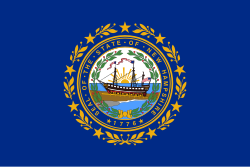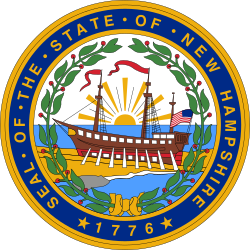
Back New Hampshire Afrikaans ኒው ሃምፕሸር Amharic Nueva Hampshire AN Nīwu Hāmtūnscīr ANG نيوهامبشير Arabic ܢܝܘ ܗܐܡܦܫܪ ARC نيو هامپشاير ARY نيو هامبشير ARZ New Hampshire AST New Hampshire suyu Aymara
New Hampshire | |
|---|---|
| Nickname(s): Granite State White Mountain State[1] | |
| Motto: | |
| Anthem: "Old New Hampshire"[2] | |
 Location of New Hampshire within the United States | |
| Country | United States |
| Before statehood | Province of New Hampshire |
| Admitted to the Union | June 21, 1788 (9th) |
| Capital | Concord |
| Largest city | Manchester |
| Largest county or equivalent | Hillsborough |
| Largest metro and urban areas | Greater Boston (combined and metro) Nashua (urban) |
| Government | |
| • Governor | Kelly Ayotte (R) |
| • Senate President | Sharon Carson (R)[note 1] |
| Legislature | General Court |
| • Upper house | Senate |
| • Lower house | House of Representatives |
| Judiciary | New Hampshire Supreme Court |
| U.S. senators | Jeanne Shaheen (D) Maggie Hassan (D) |
| U.S. House delegation | 1: Chris Pappas (D) 2: Maggie Goodlander (D) (list) |
| Area | |
• Total | 9,350[3] sq mi (24,216 km2) |
| • Land | 8,954 sq mi (23,190 km2) |
| • Water | 396 sq mi (1,026 km2) 4.2% |
| • Rank | 46th |
| Dimensions | |
| • Length | 190 mi (305 km) |
| • Width | 68 mi (110 km) |
| Elevation | 1,000 ft (300 m) |
| Highest elevation | 6,288 ft (1,916.66 m) |
| Lowest elevation (Atlantic Ocean[5]) | 0 ft (0 m) |
| Population (2024) | |
• Total | 1,409,032 |
| • Rank | 41st |
| • Density | 150/sq mi (58/km2) |
| • Rank | 21st |
| • Median household income | $96,800 (2023)[6] |
| • Income rank | 4th |
| Demonym(s) | Granite Stater New Hampshirite |
| Language | |
| • Official language | English[7] (French allowed for official business with Quebec; other languages allowed for certain specific uses)[8] |
| Time zone | UTC−05:00 (Eastern) |
| • Summer (DST) | UTC−04:00 (EDT) |
| USPS abbreviation | NH |
| ISO 3166 code | US-NH |
| Traditional abbreviation | N.H. |
| Latitude | 42° 42′ N to 45° 18′ N |
| Longitude | 70° 36′ W to 72° 33′ W |
| Website | nh |
| List of state symbols | |
|---|---|
 | |
 | |
 | |
| Living insignia | |
| Amphibian | Red-spotted newt Notophthalmus viridescens |
| Bird | Purple finch Haemorhous purpureus |
| Butterfly | Karner Blue Lycaeides melissa samuelis |
| Dog breed | Chinook |
| Fish | Freshwater: Brook trout Salvelinus fontinalis Saltwater: Striped bass Morone saxatilis |
| Flower | Purple lilac Syringa vulgaris |
| Insect | Ladybug Coccinellidae |
| Mammal | White-tailed deer Odocoileus virginianus |
| Tree | White birch Betula papyrifera |
| Inanimate insignia | |
| Food | Fruit: Pumpkin Vegetable: White Potato Berry: Blackberry[9] |
| Gemstone | Smoky quartz |
| Mineral | Beryl |
| Rock | Granite |
| Sport | Skiing |
| Tartan | New Hampshire state tartan |
| State route marker | |
 | |
| State quarter | |
 Released in 2000 | |
| Lists of United States state symbols | |
New Hampshire (/ˈhæmpʃər/ HAMP-shər) is a state in the New England region of the Northeastern United States. It borders Massachusetts to the south, Vermont to the west, Maine and the Gulf of Maine to the east, and the Canadian province of Quebec to the north. Of the 50 U.S. states, New Hampshire is the seventh-smallest by land area[10] and the tenth-least populous, with a population of 1,377,529 residents as of the 2020 census.[11] Concord is the state capital and Manchester is the most populous city. New Hampshire's motto, "Live Free or Die", reflects its role in the American Revolutionary War; its nickname, "The Granite State", refers to its extensive granite formations and quarries.[12] It is well known for holding the first primary in the U.S. presidential election cycle, and its resulting influence on American electoral politics.
New Hampshire was inhabited for thousands of years by Algonquian-speaking peoples such as the Abenaki. Europeans arrived in the 17th century, with the English establishing some of the earliest non-indigenous settlements. The Province of New Hampshire was established in 1629, named after the English county of Hampshire.[13] Following tensions between the British colonies and the crown in the 1760s, New Hampshire saw one of the earliest acts of rebellion, with the seizing of Fort William and Mary from the British in 1774. In 1776, it became the first of the British North American colonies to establish an independent government and state constitution. It signed the United States Declaration of Independence and contributed troops, ships, and supplies in the war against Britain. In 1788, it was the 9th state to ratify the U.S. Constitution, bringing it into effect. Through the mid-19th century, New Hampshire was an active center of abolitionism, and fielded close to 32,000 Union soldiers during the U.S. Civil War. Afterwards the state saw rapid industrialization and population growth, becoming a center of textile manufacturing, shoemaking, and papermaking; the Amoskeag Manufacturing Company in Manchester was the largest cotton textile plant in the world. French Canadians formed the most significant influx of immigrants, and a quarter of New Hampshire residents have French American ancestry.
Reflecting a nationwide trend, New Hampshire's industrial sector declined after World War II. Since 1950, its economy has diversified to include financial services, real estate, education, transportation and high-tech, with manufacturing still higher than the US average.[14] Its population surged as highways connected it to Greater Boston and led to more commuter towns. New Hampshire is among the wealthiest and most-educated states.[15] It is one of nine states without an income tax and has no taxes on sales, capital gains, or inheritance while relying heavily on local property taxes to fund education; consequently, its state tax burden is among the lowest in the country. New Hampshire is one of the least religious states and known for its libertarian-leaning political culture; it is one of the least liberal states in New England.[16] The New Hampshire Republican Party has held a trifecta majority in state level government since 2017, with the exception of 2019 and 2020, while the Democratic Party has held a majority on federal level representation in Congress. New Hampshire is the only state to have a woman as governor and women as both U.S. senators.[17]
With its mountainous and heavily forested terrain, New Hampshire has a growing tourism sector centered on recreation. It has some of the highest ski mountains on the East Coast and is a major destination for winter sports; Mount Monadnock is among the most climbed mountains in the world. Other activities include observing the fall foliage, summer cottages along lakes and the seacoast, motorsports at the New Hampshire Motor Speedway in Loudon, and Motorcycle Week, a motorcycle rally held in Weirs Beach in Laconia. The White Mountain National Forest includes most of the Appalachian Trail between Vermont and Maine, and has the Mount Washington Auto Road, where visitors may drive to the top of 6,288-foot (1,917 m) Mount Washington.
- ^ For use in a reference publication see Mencken, H. L. (1990). American Language Supplement 2. Knopf-Doubleday.
The adjoining New Hampshire is usually called the Granite State, which the DAE traces to 1830. It has also been called the White Mountain State, the Mother of Rivers, and the Switzerland of America
- For official use see "Fast New Hampshire Facts". New Hampshire Almanac. State of New Hampshire. Archived from the original on May 25, 2017. Retrieved February 12, 2018.
- For contemporary use see "'Live Free or Die'—The Story of the New Hampshire Motto". New England Today. Yankee Publishing, Inc. August 10, 2017. Archived from the original on February 12, 2018. Retrieved February 12, 2018.
For tourism purposes, however, New Hampshire typically tones it down a bit, presenting itself as the Granite State or the White Mountain State ...
- ^ New Hampshire State Library. "State Official and Honorary State Song". NH.gov. State of New Hampshire. Retrieved February 23, 2021.
- ^ "Geographic Identifiers: New Hampshire". U.S. Census Bureau. Retrieved November 29, 2023.
- ^ "Mt Wash". NGS Data Sheet. National Geodetic Survey, National Oceanic and Atmospheric Administration, United States Department of Commerce. Retrieved October 20, 2011.
- ^ a b "Elevations and Distances in the United States". United States Geological Survey. 2001. Archived from the original on October 15, 2011. Retrieved October 24, 2011.
- ^ "Household Income in States and Metropolitan Areas: 2023" (PDF). Retrieved January 12, 2025.
- ^ "New Hampshire Revised Statutes, Title 1, Chapter 3-C:1—Official State Language". State of New Hampshire. 1995. Archived from the original on October 4, 2018. Retrieved December 9, 2016.
- ^ "New Hampshire Revised Statutes, Title 1, Chapter 3-C:2—Exceptions". State of New Hampshire. 1995. Archived from the original on November 17, 2004. Retrieved December 9, 2016.
- ^ Fehlau, Erin (June 16, 2017). "Blackberry now the state berry of NH". WMUR News. Retrieved December 30, 2019.
- ^ "State Area Measurements and Internal Point Coordinates". census.gov. 2010. Retrieved January 2, 2025.
- ^ "U.S. Census Bureau QuickFacts: United States". www.census.gov. Archived from the original on April 11, 2020. Retrieved January 2, 2025.
- ^ "Visit NH: State Facts". NH Department of Resources and Economic Development. Archived from the original on October 14, 2010. Retrieved August 30, 2010.
- ^ "Origin of "New Hampshire"". State Symbols USA. September 28, 2014. Archived from the original on September 4, 2015. Retrieved August 30, 2015.
- ^ "Economy by Industry in N.H. and U.S." Carsey School of Public Policy | UNH. August 21, 2019. Retrieved July 20, 2021.
- ^ "New Hampshire | Education". Census Bureau Data. Retrieved August 6, 2023.
- ^ Jacobs, Ben (October 13, 2022). "The politics of New Hampshire, America's quirkiest state, explained". Vox. Retrieved September 17, 2023.
Parsing the old, white, educated, libertarian, anti-tax, pro-choice politics of New Hampshire.
- ^ "Party control of New Hampshire state government". Ballotpedia. Retrieved February 26, 2025.
Cite error: There are <ref group=note> tags on this page, but the references will not show without a {{reflist|group=note}} template (see the help page).
© MMXXIII Rich X Search. We shall prevail. All rights reserved. Rich X Search
